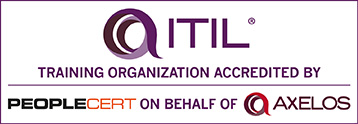This course leads to the ITIL Certificate – Service Strategy. This is a free-standing qualification, but is also part of the ITIL Intermediate Lifecycle stream, and one of the modules that leads to the ITIL Expert Certificate in IT Service Management.
Service Strategy
Out of stock
Description
Service Strategy
This course leads to the ITIL Certificate – Service Strategy. This is a free-standing qualification, but is also part of the ITIL Intermediate Lifecycle stream, and one of the modules that leads to the ITIL Expert Certificate in IT Service Management.
The course covers the management and control of the activities and techniques within the Service Strategy stage, but not the detail of each of the supporting processes.
| Length | 3 days |
| Target group | This course is suitable for individuals who require a detailed understanding of the ITIL Service Strategy phase of the ITIL core Lifecycle and how it may be implemented to enhance the quality of IT service provision within an organisation.It is particularly suitable for: CIOs, CTOs, managers, supervisory staff, team leaders, designers, architects, planners, IT consultants, IT audit managers, IT security managers, service test managers and ITSM trainers. |
| Exam | The examination is closed book and made up of multiple choice questions based on a scenario. Students will be allowed 120 minutes to answer the questions. You need at least 70% (28/40 points) to pass. |
| Prerequisites | Candidates wishing to be trained and pass the exam for this qualification must already hold the ITIL Foundation Certificate. |
You’ll learn
Detailed understanding of processes, functions and activities related to Service Strategy within the Service Lifecycle.
- Introduction to service strategy
- Service strategy principles
- Service strategy processes
- Governance
- Organizing for service strategy
- Technology considerations
- Implementing service strategy
- Challenges, critical success factors and risks
Course content
Introduction to service strategy
- Full understanding of service strategy terms and core concepts.
- The purpose, goals, scope and objectives of service strategy
- The value to the business
- The context of service strategy in relation to all other lifecycle stages.
Service strategy principles
- The ability to decide on a service strategy
- How to define services, create value and leverage the combined use of utility and warranty
- How to use service economics and sourcing strategies when meeting business outcomes.
Service strategy processes
- The management level concepts for the five service strategy processes and how they flow and integrate with the lifecycle
- The purpose, scope and objectives of each service strategy process and how they link to value for the business.
Governance
- The ability to analyse IT governance and use it to set strategy by leveraging governance framework and bodies.
Organizing for service strategy
- The ability to create an organizational design using the relevant development and departmental methods.
Technology considerations
- Understand the relevance and opportunities for service automation and the importance and application of technology interfaces across the lifecycle.
Implementing service strategy
- Develop implementation strategies that follow a lifecycle approach (e.g. design, transition, operation and improvement, programmes).
Challenges, critical success factors and risks
- The ability to provide insight and guidance for strategic challenges, risks and critical success factors.
Request Information
Please select your inquiry type below, then fill out the form and we’ll get in touch with you.
Additional information
| City | Stockholm |
|---|---|
| Training Provider | Aim 4 Knowledge |

